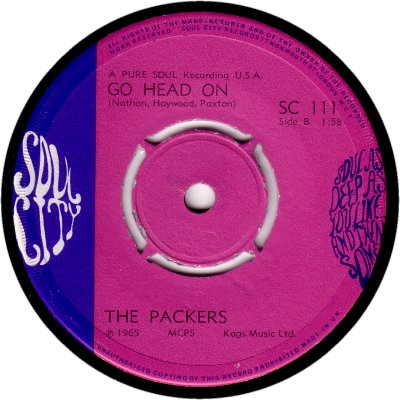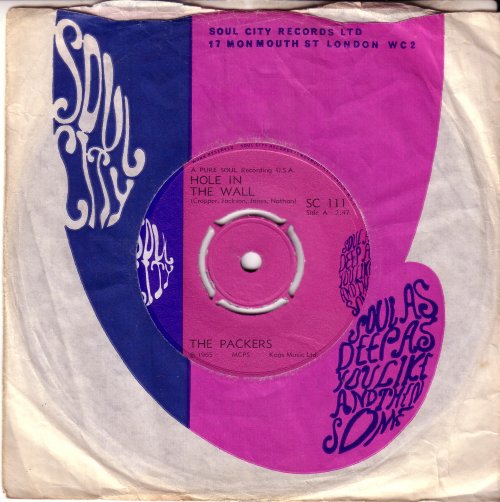

A British label; no relation to Johnny Rivers's American company of the same name. As its name indicates, Soul City was devoted to Soul music. It started life as a Soul-orientated record shop operated by Dave Godin, David Nathan and Robert Blackmore, and eventually progressed to the point where it started licensing tracks from US companies and releasing them on its own label. Starting in 1968 some nineteen singles were issued in an SC-100 numerical series, along with six more on the sister-label, Deep Soul (q.v.). There were also several albums. It's far from certain that Soul City put out any singles in the 1970s. According to the 45cat site SC-118 was reviewed in 'Record Mirror' of October 1969, and the intended July 1970 release of SC-120, 'Since There's No Doubt' by Chris Jackson, was cancelled, which leaves SC-119, Allen Toussaint's 'We The People' b/w 'Tequila', as the only possible single from 1970, the year in which Soul City closed down. The 45cat site has it as being released on the 31st of October 1969 but Discogs gives January 1970, so I'll leave this page on the site pending a definite negative - the Deep Soul subsidiary managed one single in 1970, so the company was still active in that year.
Soul City received quite a few mentions in 'Record Retailer'. Its first appearance came in the form of an advert for its first single, in 'RR' of the 13th of March 1968; not long afterwards 'RR' of the 10th of April observed that the second single had been made available on the 5th. 'RR' of the 17th of July supplied more details of the company: it said that the shop in Museum Street stocked only US recordings for Soul fans, the bulk of those recordings being obtained from the UK distributors of the American labels. Records on its own label were distributed by Island and Philips, with Orlake handling manufacture. The article confirmed the March start date, and observed that SC-102, 'Nothing Can Stop Me' b/w 'The Big Lie' by Gene Chandler, had been in the Top 50 'recently' - it reached No.41. There appears to have been some shuffling-around of distributors: 'RR' of the 22nd of January 1969 gave them as Island, Lugton, Keith Prowse, H.R. Taylor and Pama, but the issue of the 23rd of April said that Island and Philips were exclusively responsible for carrying out that task.
Soul City seems to have run into terminal difficulties in the summer of 1970. 'RR' of the 25th of July reported that after having been with Philips and Island previously the company was due to switch to CBS from the 31st of that month. SC-120 was to be the first single under the new deal, and the plan was for a new release every week as well as expansion into the LP market. Sadly, however, the plans came to nothing. The release of SC-120 was cancelled, as mentioned above, and there's no evidence of any material being released through CBS. The end was noted in 'RR' of the 7th of November 1970, which said that Soul City Enterprises, operating out of The Quadrant, Richmond, had been wound up on the previous Monday. As an aside, it may be of interest that Billboard magazine of the 6th of September 1969 reported that the company was launching a subsidiary label, Forget Me Not, with a James Carr single sub-licensed from Bell Records - presumably the record in question was 'A Man Needs A Woman', which had come out on Bell the previous year. The launch never happened, and it may be that by that time Soul City was starting to feel the pinch financially. There is however a happy postscript to the Soul City story: the label was revived in the 2000s, with the approval of Dave Godin, and it issued singles in the same 7" format as the original, with the same style of labels and company sleeves. Numbers for the latter-day releases were from SC-123 on. Soul City releases from the '60s are generally collectable. One label design served throughout; demo copies had the same design but in black-on-white with a medium-sized 'A' at 4 o'clock. Godin had another crack at the record market in the mid '70s with his 'Right On!' label (q.v.).


Copyright 2007 Robert Lyons.

